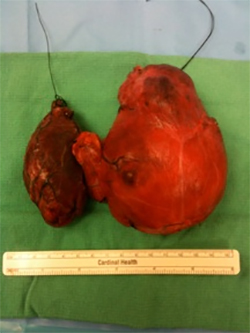
Multi-nodular Goiter
Multi-nodular goiter (MNG) is a medical term describing an enlarged, lumpy thyroid gland. While iodine deficiency is a common cause world-wide, this is not true in the US. In the US, the cause is usually multifactorial and, in a given individual, frequently hard to determine. It is more common in women than men. It may run in families. Most goiters are not a cause of symptoms and don’t require any treatment. When a goiter is found three questions need to be answered.
- Is it cancer? The vast majority of MNGs are not cancer. In an otherwise uncomplicated goiter the risk of cancer is not significantly greater than in a patient with a non goitrous thyroid gland. Multiple nodules are usually present. Large nodules more than 1/2 inch in size should be considered for biopsy (FNA). A rapid change in size of the goiter or nodule may suggest malignancy but usually does not. These findings should be evaluated by an experienced physician to exclude cancer.
- Is the function of the thyroid gland normal? Most goiters do not affect the function of the thyroid gland. However a goiter may secrete too much thyroid hormone. This is called a toxic goiter. An I-131 thyroid scan may be indicated to help evaluate this. Frequently, a toxic goiter is treated surgically. On occasion it may be treated medically. If surgery is indicated then control of the over functioning gland is required pre-operatively. This is usually done with anti-thyroid medication. In other situations the function of the gland is under-active and this is commonly treated with thyroid hormone replacement therapy. Unless the goiter is causing local symptoms, surgery is not usually required when the goiter is under active. In patients with variation in the function of the thyroid, evaluation by an endocrinologist or experienced primary care physician may be indicated.
- Is the goiter causing local symptoms? A goiter may grow large enough to compress adjacent structures like the airway or swallowing tube(esophagus). Patients may experience difficulty swallowing, choking sensation, voice change or difficult breathing. Commonly the symptoms are worse when lying down.
If the answer to either question one or three is “yes “ then surgery may be appropriate. If the answer to question two is “yes” then an evaluation by an endocrinologist should be considered. If a toxic goiter is found then medical therapy with anti-thyroid medication and/or radioactive iodine may be appropriate. Surgery may also be indicated. Generally, if cancer can be excluded and the goiter is not causing local symptoms and there is no alteration in function of the thyroid gland then observation is usually recommended.
Occasionally the use of thyroid hormone in pill form is recommended to try to reduce the size of the goiter. This involves giving slightly higher doses of thyroid hormone than would normally be present in the body in an effort to reduce stimulation of the thyroid from the pituitary gland( the gland that regulates the thyroid). Unfortunately this approach doesn’t work well in many clinical situations and there are potential side effects of giving above normal doses of thyroid hormone. For these reasons, in simple goiters, thyroid hormone therapy is not commonly recommended. Hashimoto’s thyroiditis, a chronic inflammatory condition of he thyroid gland, and a common cause of MNG, may be effectively treated with thyroid hormone.
